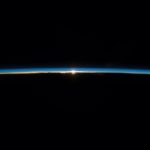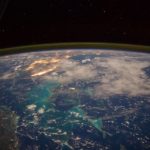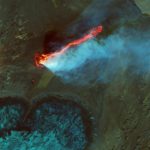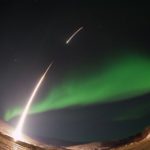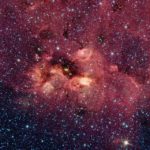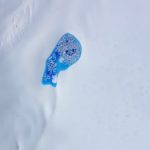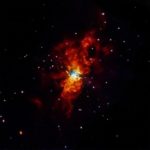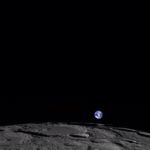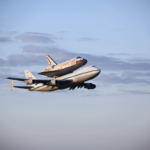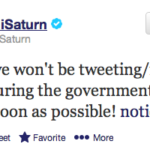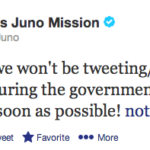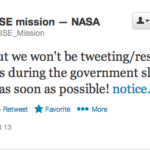Voyager is so happy, because it’s the bravest satellite of all. It has gone the furthest. And it’s not lonely, because it’s talking to us. It phones home. And it tells us all about the wonderful things that it’s seeing. …There’s a whole universe to explore, and it’s just leaving our Solar System right now. It’s very brave and very lucky to be doing what it’s doing, so it’s not going to get lost. It’s traveled further than anything we’ve ever built has traveled before. It’s actually showing us the way. …
It might have been safer for it to just stay home, and stay inside a building, but then it would have been sad forever, because it never would have done its purpose. It never would have discovered things. It’s all a wonderful story of great discovery and success, and it couldn’t have happened if Voyager hadn’t been brave…
It’s not really the fact that everything always has a start and an end, it’s what happens in the middle that counts. What do you while you’re alive? What do you do while you’re laughing? And I think we’re doing exactly what makes Voyager joyful and as happy as it could be.
Think about the fact that you’re a little bit like Voyager. In that you’re going to go see the world, and you’re going to call your mom on the phone and tell her about the wonderful things that you see. … You wouldn’t want to spend your whole life hiding under your bed and never seeing anything in your whole life, you want to be able to do what makes you happy and joyful and learn about things to discover. You might be the person that discovers something really important for everybody else on the world, but you can never discover that if you just hide and only do things that are safe. So think about yourself a little bit like Voyager. What makes you laugh? It’s not just staying, hiding underneath your bed safely at home.
Cmdr. Chris Hadfield, reassuring a five-year-old who was worried about the Voyager satellite (source)
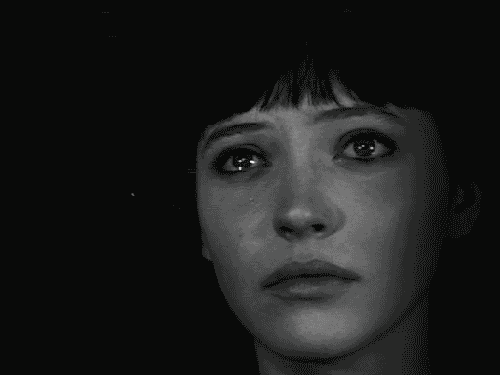
gewitter-nacht-deactivated20141:
Orion: I’m on Board – John Barrowman.
Actor John Barrowman would like to introduce you to NASA’s new spacecraft, Orion.
(x)
A lot of us have probably seen the Saturn V launches, but the liftoff from the moon is just as impressive.
Little known fact: the liftoff of the Lunar Excursion Module (LEM) was the first time the propulsion system was tested. THE ONLY TIME. If it would have failed, there would have been two very stranded astronauts on the lunar surface. In fact, there was a letter drafted by Nixon in case something of this magnitude happened.
Bowie’s last day – we had permission for a year, so our Space Oddity video comes down today. One last look.
This is a photo taken by Voyager 1 in 1990. The shiny dot in the middle of the picture is Earth from a distance of 6 billion kilometers (3.7 billion miles). And here is the interpretation of this photo by Carl Sagan, astronomer, astrophysicist of the 20th century.
Pale Blue dot: A Vision of the Human Future in Space – Carl Sagan
“From this distant vantage point, the Earth might not seem of any particular interest. But for us, it’s different. Consider again that dot. That’s here. That’s home. That’s us. On it everyone you love, everyone you know, everyone you ever heard of, every human being who ever was, lived out their lives. The aggregate of our joy and suffering, thousands of confident religions, ideologies, and economic doctrines, every hunter and forager, every hero and coward, every creator and destroyer of civilization, every king and peasant, every young couple in love, every mother and father, hopeful child, inventor and explorer, every teacher of morals, every corrupt politician, every “superstar,” every “supreme leader,” every saint and sinner in the history of our species lived there – on a mote of dust suspended in a sunbeam.
The Earth is a very small stage in a vast cosmic arena. Think of the rivers of blood spilled by all those generals and emperors so that in glory and triumph they could become the momentary masters of a fraction of a dot. Think of the endless cruelties visited by the inhabitants of one corner of this pixel on the scarcely distinguishable inhabitants of some other corner. How frequent their misunderstandings, how eager they are to kill one another, how fervent their hatreds. Our posturings, our imagined self-importance, the delusion that we have some privileged position in the universe, are challenged by this point of pale light. Our planet is a lonely speck in the great enveloping cosmic dark. In our obscurity – in all this vastness – there is no hint that help will come from elsewhere to save us from ourselves.
The Earth is the only world known, so far, to harbor life. There is nowhere else, at least in the near future, to which our species could migrate. Visit, yes. Settle, not yet. Like it or not, for the moment, the Earth is where we make our stand. It has been said that astronomy is a humbling and character-building experience. There is perhaps no better demonstration of the folly of human conceits than this distant image of our tiny world. To me, it underscores our responsibility to deal more kindly with one another and to preserve and cherish the pale blue dot, the only home we’ve ever known.

